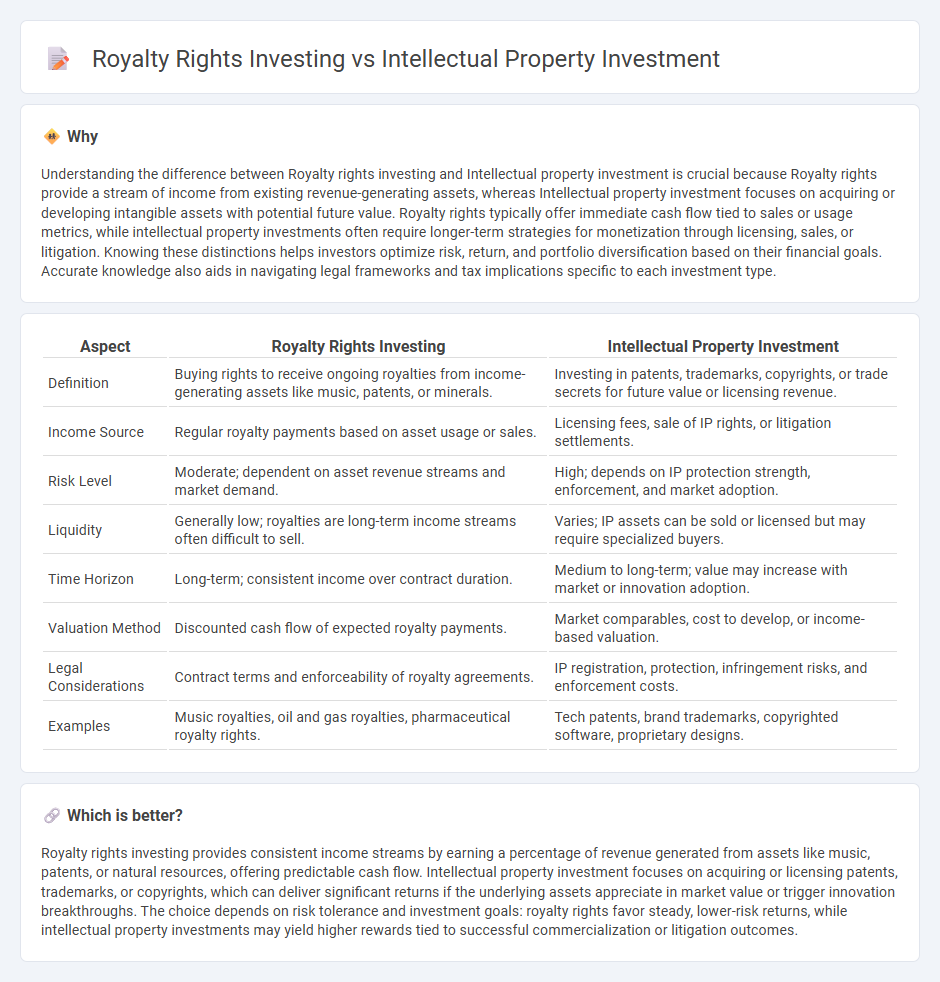
Royalty rights investing involves purchasing entitlement to a percentage of revenue generated from assets like music, patents, or mineral rights, providing steady passive income. Intellectual property investment focuses on acquiring or developing patents, trademarks, or copyrights to capitalize on innovation and exclusive market advantages. Explore the key differences and benefits of these investment strategies to make informed financial decisions.
Why it is important
Understanding the difference between Royalty rights investing and Intellectual property investment is crucial because Royalty rights provide a stream of income from existing revenue-generating assets, whereas Intellectual property investment focuses on acquiring or developing intangible assets with potential future value. Royalty rights typically offer immediate cash flow tied to sales or usage metrics, while intellectual property investments often require longer-term strategies for monetization through licensing, sales, or litigation. Knowing these distinctions helps investors optimize risk, return, and portfolio diversification based on their financial goals. Accurate knowledge also aids in navigating legal frameworks and tax implications specific to each investment type.
Comparison Table
| Aspect | Royalty Rights Investing | Intellectual Property Investment |
|---|---|---|
| Definition | Buying rights to receive ongoing royalties from income-generating assets like music, patents, or minerals. | Investing in patents, trademarks, copyrights, or trade secrets for future value or licensing revenue. |
| Income Source | Regular royalty payments based on asset usage or sales. | Licensing fees, sale of IP rights, or litigation settlements. |
| Risk Level | Moderate; dependent on asset revenue streams and market demand. | High; depends on IP protection strength, enforcement, and market adoption. |
| Liquidity | Generally low; royalties are long-term income streams often difficult to sell. | Varies; IP assets can be sold or licensed but may require specialized buyers. |
| Time Horizon | Long-term; consistent income over contract duration. | Medium to long-term; value may increase with market or innovation adoption. |
| Valuation Method | Discounted cash flow of expected royalty payments. | Market comparables, cost to develop, or income-based valuation. |
| Legal Considerations | Contract terms and enforceability of royalty agreements. | IP registration, protection, infringement risks, and enforcement costs. |
| Examples | Music royalties, oil and gas royalties, pharmaceutical royalty rights. | Tech patents, brand trademarks, copyrighted software, proprietary designs. |
Which is better?
Royalty rights investing provides consistent income streams by earning a percentage of revenue generated from assets like music, patents, or natural resources, offering predictable cash flow. Intellectual property investment focuses on acquiring or licensing patents, trademarks, or copyrights, which can deliver significant returns if the underlying assets appreciate in market value or trigger innovation breakthroughs. The choice depends on risk tolerance and investment goals: royalty rights favor steady, lower-risk returns, while intellectual property investments may yield higher rewards tied to successful commercialization or litigation outcomes.
Connection
Royalty rights investing and intellectual property investment are connected through the monetization of intangible assets such as patents, trademarks, copyrights, and royalties from created works. Both investment types generate income streams by leveraging legal ownership rights that produce ongoing payments based on usage or sales. Investors analyze the valuation, potential royalties, and market demand of intellectual property to maximize returns in royalty rights portfolios.
Key Terms
Patent Valuation
Investing in intellectual property (IP), particularly through royalty rights, offers distinct advantages by generating ongoing revenue streams based on patent valuation and licensing agreements. Patent valuation incorporates factors such as market potential, legal strength, and patent life, which directly influence royalty income and risk assessment. Explore patent valuation techniques to make informed decisions that maximize returns in IP and royalty rights investing.
Licensing Agreement
Intellectual property investment primarily involves acquiring ownership or equity in patents, copyrights, or trademarks, providing long-term value through market control and exclusivity, while royalty rights investing focuses on securing a percentage of revenue generated from the usage of these assets under licensing agreements. Licensing agreements formalize the terms between IP owners and licensees, specifying royalty rates, duration, and territorial scope, which directly impacts the investor's return on royalty rights. Explore deeper insights into optimizing returns and managing risks in IP and royalty rights investments through strategic licensing agreements.
Revenue Stream
Intellectual property investment involves acquiring patents, trademarks, or copyrights to generate long-term capital gains through licensing and market exclusivity, while royalty rights investing focuses on purchasing rights to ongoing revenue streams from existing intellectual properties, such as music royalties or book royalties. Revenue streams in intellectual property investment may fluctuate based on market demand and legal protections, whereas royalty rights provide more predictable, passive income tied directly to the performance of the underlying assets. Explore more about the distinct revenue implications and risk profiles of these investment strategies to optimize your portfolio.
Source and External Links
Investing in Intellectual Property - Chicago-Kent - Intellectual property investments, such as patents and trademarks, offer high risk but potentially high reward by generating recurring revenue through licensing, selling, or using IP as collateral, and have provided companies a competitive market edge and growth opportunities.
Investing Beyond BizBuySell: Why Intellectual Property Is the Future ... - IP investments provide passive income, act as an inflation hedge, diversify portfolios, and deliver long-term value, although they involve challenges such as valuation uncertainty and legal risks.
Intellectual property can generate financial returns - Yieldstreet - IP can generate income through royalties and capital appreciation, with securitization offering firms liquidity and allowing investors to gain returns from copyrighted or patented assets.
 dowidth.com
dowidth.com